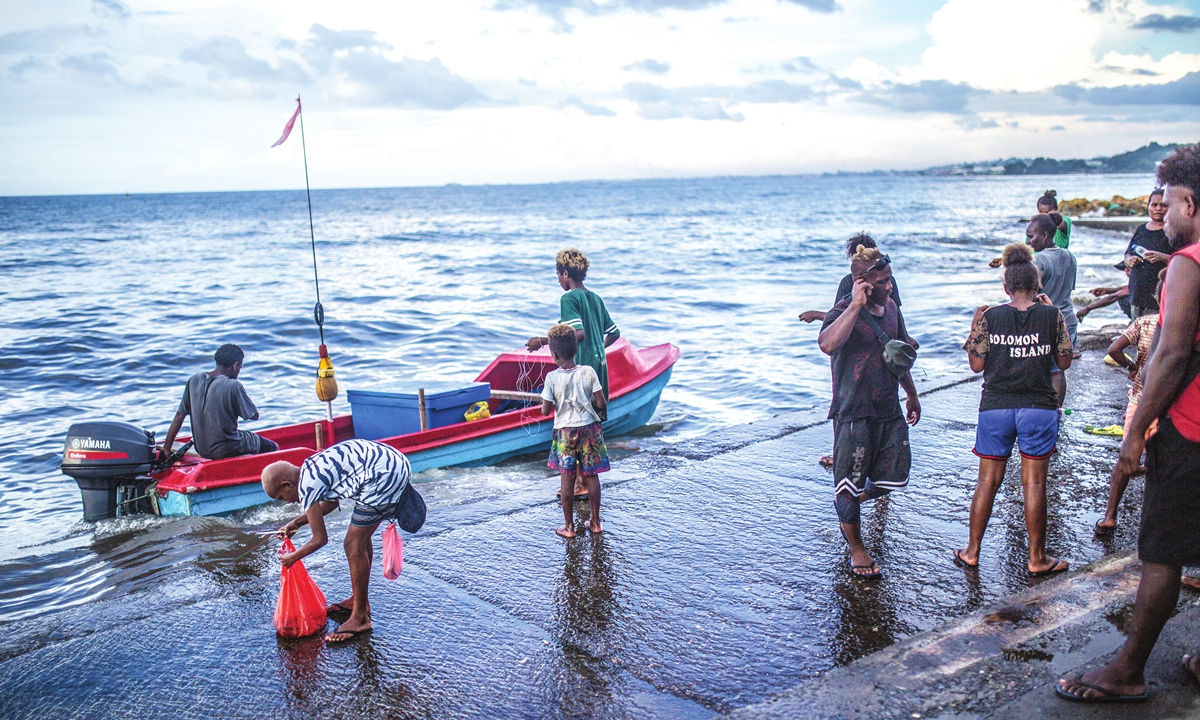
A view of a Fijian beach. Photo: Shan Jie/GT
Editor's Note:Today, issues related to the climate change, as a shared challenge faced by humanity, are receiving significant attention, and climate cooperation has become an integral part of the Belt and Road Initiative (BRI). The demands of the ecologically vulnerable and climate-affected Pacific Island countries have garnered particular attention. Global Times reporter Shan Jie (GT) recently talked with Chen Dezheng (Chen), vice director of the China-Pacific Island Countries Climate Change Cooperation Center and the director of the Research Center for Pacific Island Countries at the Liaocheng University in Shandong, to discuss how China, as a responsible major nation, has engaged in climate cooperation with Pacific Island countries in the recent years, the support China can offer to the South Pacific to reduce the risk of and harms from climate change, and the climate change-related demands shared by China and Pacific Island countries as developing countries via the BRI.

Chen Dezheng Photo: Courtesy of Chen
GT: The China-Pacific Island Countries Climate Change Cooperation Center has been in operation for a year and a half since its launch in April 2022. Under the BRI framework, what achievements have been made so far, and what plans are underway for further work?Chen: Since its establishment, the center has organized five high-level academic conferences, including the China-Pacific Island Countries Climate Change High-level Dialogue. In June and November of 2022, it conducted two climate change training courses for officials, scholars, and technical personnel from Pacific Island countries (PICs).
The center has also signed cooperation memoranda and strategic cooperation agreements with institutions such as the University of the South Pacific, the National University of Samoa, the Chinese Academy of Sciences' Institute of Atmospheric Physics, and the Ministry of Natural Resources' Second Institute of Oceanography. It has established an atmospheric environment and source analysis laboratory, meteorological stations, and 10 research teams, including those focused on integrated photovoltaic and wind energy generation.
Additionally, it has implemented small-scale climate aid projects for PICs and undertook a 2 million yuan ($280,000) agricultural planting technology project in Tonga. The head of the climate center also visited PICs to introduce the progress of related work to various sectors in those countries. The center also hosted visits by prominent leaders from island countries, including the Speaker of the Parliament of Vanuatu and the Minister of Internal Affairs of Kiribati.
GT: What are the highlights of the cooperation on climate affairs between China and the PICs with the BRI?
Chen: China places great importance on the unique circumstances and concerns of PICs regarding climate change and is committed to helping these countries enhance their climate change resilience. China is dedicated to cooperating with island countries on various levels and through various means to improve their capacity for climate adaptation and climate change mitigation, and high-quality development.
In 2018, China supported the construction of a China-Vanuatu marine joint observation station, continuing collaborative efforts in ocean observation and disaster risk reduction with Vanuatu. To further advance maritime cooperation between China and Vanuatu, China's National Marine Technology Center, in collaboration with the Vanuatu Meteorology and Geo-Hazards Department (VMGD) and the Public Works Department (PWD), jointly planned the construction of Phase II of the China-Vanuatu joint observation station, including a meteorological station. The meteorological station's designs have been completed, and progress is being made in the construction of meteorological infrastructure.
China's National Marine Environmental Forecasting Center (The Tsunami Advisory Center of the Ministry of National Resources) utilizes the national ocean forecasting and warning platform to continuously track and analyze global undersea earthquakes and tsunami monitoring data, providing ocean disaster warning and alert services. In 2023, the center issued tsunami alerts for the Kermadec Islands waters of New Zealand, the waters of Tonga, the southern waters of the Fiji Islands, the New Caledonia waters, and the waters of Papua New Guinea, thereby assisting PICs in safeguarding against marine disasters.
Through initiatives such as the "The Marine Scholarship of China," China has provided scholarship opportunities in marine, environmental, and climate-related areas to PICs. This aligns with China's commitment to offer 2,500 government scholarship opportunities to PICs from 2020 to 2025.
GT: In August, you attended the Pacific Small Island Developing States (SIDS) High-Level Dialogue on Climate Change in Suva, the capital of Fiji, and conducted visits to countries like Kiribati and Tonga. From your understanding, what impact has climate change had on the local people's livelihoods and production? Are you also aware of the local perspectives on climate change?
Chen: After engaging with government departments and academic institutions in countries like Samoa, Tonga, Fiji, Kiribati, and others, we have learned that climate change has led to various natural disasters such as high temperatures, floods, droughts and storms, causing damage to the homes of the island nations' residents, reducing their incomes, and affecting their livelihoods significantly.
The interviewees of our research unanimously acknowledged the clear effects of global warming and believe that the intensity and frequency of natural disasters have increased over the last five years.
At the same time, the interviewees all recognized the helpful role of China's assistance in the island nations' efforts to address climate change. Regarding areas of assistance that should be strengthened in the future, more than half of the interviewees suggested enhancing vocational training, disaster relief supplies, and coastal zone planning and management. Over one-third of the interviewees believed that support should be increased in higher education, research facilities, research projects, financial aid, infrastructure, and technology transfer.
GT: The 2023 United Nations Climate Change Conference or Conference of the Parties of the UNFCCC (COP28) is scheduled to be held in the United Arab Emirates from November 30 to December 12. In terms of climate change, what are the demands of PICs? Have these demands received sufficient attention from developed countries?
Chen: The Pacific island region is one of the most severely affected areas by climate change, characterized by significant environmental sensitivity and vulnerability. Global climate change profoundly affects their right to survival and development. Global climate governance is crucial for the sustainable development of PICs. Over the years, PICs have consistently voiced their concerns on the international stage, advocated for a voice in global climate governance, presented their demands and requests for participation in global climate governance, and continuously pushed for the implementation of climate governance policies and measures in their region. They have become an important force that cannot be ignored in global climate governance.
China has taken into account the demands of island countries in addressing climate change and provided targeted climate governance assistance. However, as a vulnerable group in the international community, PICs still face some challenges in climate governance: Lack of sufficient international discourse power; limited economic capacity and insufficient funding for climate change adaptation; lagging infrastructure development for climate change adaptation; lack of core climate change technologies, and the need for further strengthening of their own efforts in climate governance.

People gather at a beach of Honiara, the Solomon Islands, on August 21, 2023. Photo: Shan Jie/GT
GT: What are the paths for China climate governance collaboration with PICs?Chen: China, as a responsible major nation in the field of climate governance, particularly in its determination and actions in addressing climate change, has instilled hope and bolstered confidence in island countries' efforts to combat climate change. China's principles of green development and sustainability within its ecological civilization construction align closely with the climate change objectives of PICs. The future of climate cooperation between China and the PICs holds even greater promise, facilitating the advancement of the China-PICs community of shared future.
In driving the process of climate cooperation with PICs, China should adopt a strategic approach that combines post-disaster management and source control, and interconnects short and medium- to long-term goals.
Guided by the principle of "harmonious coexistence between humans and nature," China and the PICs could strengthen the exchange and mutual learning of climate governance concepts.
China and island countries should advance high-quality BRI cooperation to enhance disaster protection infrastructure in island countries. China has emphasized the alignment of the BRI initiative with strategic goals, including practical infrastructure cooperation related to natural disasters such as storm surge protection. Exploring ways to enhance disaster resilience in island countries, including the planning and construction of disaster-resistant infrastructure like storm surge barriers and monitoring stations, water storage facilities to combat drought, and improved building standards, is essential.
China could support island nations in developing new energy sources. China encourages enterprises in the solar power and wind power sectors to "go global" and promote the development of exemplary green energy projects. Through flexible cooperation in green industry investment, China aims to help island nations address their energy needs sustainably.
Under the framework of South-South cooperation on climate change, China has allocated approximately 1.1 billion yuan in recent years to provide energy-efficient and new energy products and equipment to developing countries. China possesses technical expertise and operational experience in photovoltaic, tidal, and wave energy generation, as well as small-scale integrated energy solutions. It is recommended to assist island countries in assessing their suitability for solar, wind, and marine energy sources and tailor assistance projects accordingly to their natural conditions and development needs.
PICs have vast exclusive economic zones spanning over 30 million square kilometers, holding tremendous potential for blue economic development. China has actively promoted high-quality, green, and low-carbon development in the marine economy, with advanced expertise in seawater aquaculture and marine ranch construction. China has also established a comprehensive marine spatial planning technology system, which can assist PICs in achieving sustainable development that is low-carbon and environmentally friendly in various aspects.






